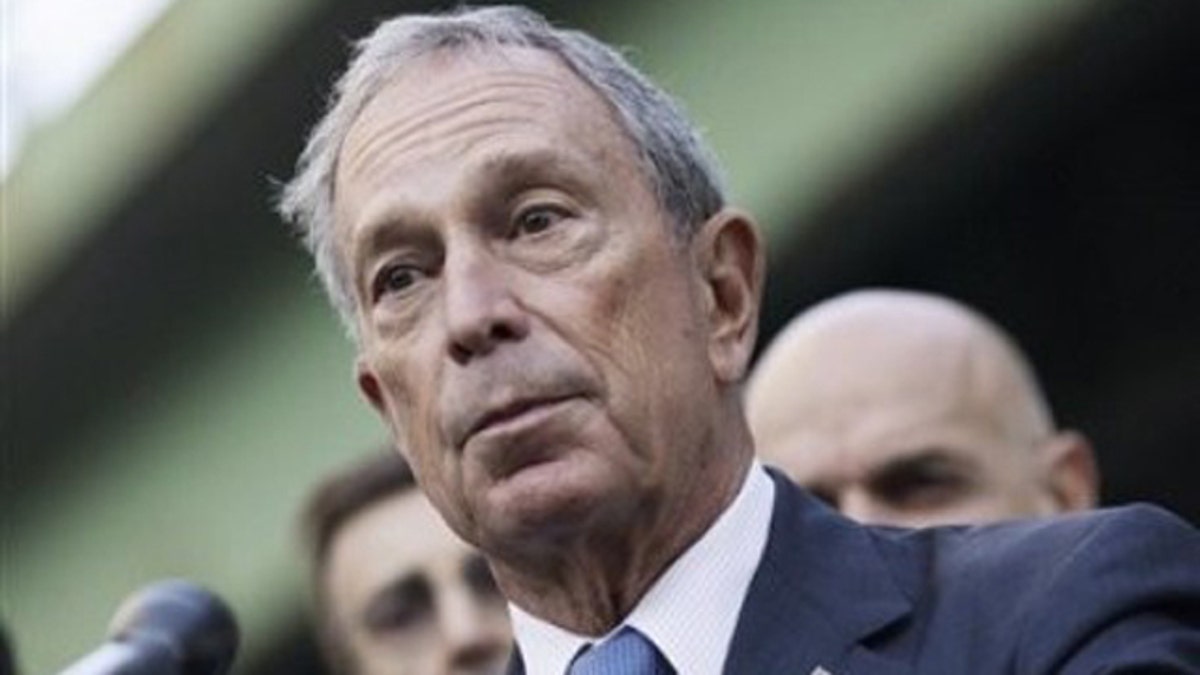
Oct. 3, 2011: New York City Mayor Michael Bloomberg speaks during a news conference in New York. (AP)
NEW YORK -- In a clash of New York City mayors past and present, Mayor Michael Bloomberg and former Mayor Ed Koch took opposing sides at a panel discussion Tuesday over the Occupy Wall Street protests -- with Bloomberg coming to the defense of banks and Koch angrily calling for criminal prosecutions of corporate executives.
"It was not the banks that created the mortgage crisis. It was, plain and simple, Congress," said Bloomberg, himself a former executive of a financial information company, at the event for business leaders.
Koch responded by noting that major banks have been fined hundreds of millions of dollars.
"What do you think they got fined for? Schmutz on the sidewalk?" he asked in his signature New York twang, using a Yiddish term for dirt.
Calling himself enormously angry, Koch called for the criminal prosecution of a CEO or CFO of a major corporation.
"They beggared the people in this country," he said. "There's something wrong with a kid who steals a bike going to jail, and someone who steals millions paying a fine."
Bloomberg dismissed the downtown encampment now entering its seventh week on the footstep of Wall Street, saying "it's fun and it's cathartic" to complain, "but it doesn't do anything for the future."
"Catharsis is good," Koch responded.
Former Mayor David Dinkins, also on the panel, stayed out of the discussion of the protests, saying that he would leave it to the experts to debate fiscal matters.
Despite any disagreements, the tone of the discussion moderated by PBS host Charlie Rose remained genial, with the three mayors reminiscing about the highs and lows of their terms.
Bloomberg, in the midst of a rough third term in which his poll numbers have dipped, said that he's not as inured to the public's opinion of him as he might seem.
"You just have to keep a straight upper lip and never let anybody know that they're getting to you," he said. "Does the criticism hurt? Of course it hurts."
Still, while many have speculated that the mayor might now regret his ardent bid for a third term, Bloomberg said he still thrills at the chance to walk into City Hall.
"I love every single day getting up, even though you're going to get beaten up," he said. "The greater the challenge that day, the more the adrenaline goes and the more you look forward to getting in there."
Asked about his proudest accomplishments as mayor, Bloomberg cited his takeover of the school system, the rise in life expectancy among city residents and the diversification of the city's economy. He said his biggest failure was his inability to get state passage of his congestion pricing plan to charge people to drive in Manhattan, in an effort to improve the city's transit system.
Dinkins, who served from 1990 to 1993, said his biggest disappointment as mayor was his failure to stop the 1991 Crown Heights riots after the death of a 7-year-old black boy in an auto accident involving a motorcade of a Jewish religious leaders. A Jewish man was stabbed to death in retaliation, and days of rioting on both sides followed.
He said he was proudest of keeping the city's libraries open six days a week despite budget shortages, keeping the U.S. Open tennis championship in New York, passing public safety programs and hosting Nelson Mandela in 1990.
Koch, who was mayor from 1978 to 1989, said he treasured the memory of going to the Brooklyn Bridge in person to urge commuters to cross by foot during the 1980 transit strike. In hindsight, he said he regrets having forced the closure of a Harlem hospital that many people in the black community treasured because of its early admission of black doctors.




